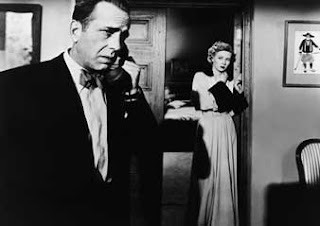 According to Jean-Luc Godard, le cinéma, c'est Nicholas Ray. Look at these images from two of Ray's masterpieces, Bigger than Life and In a Lonely Place. Notice how the framing of Bogart dominates Gloria Grahame anxiously standing in a doorway, with noir shadows adding the appropriate atmosphere of foreboding. Of course this is hardly a typical film noir, but an intensely romantic, autobiographical exmination of a relationship torn apart by Bogart's violent nature at war with his love for Grahame, never better as the would-be redemptive figure who can't save this tortured screenwriter from his own self-destruction. The shamelessly sentimental lines spoken by both Bogart and Grahame rank among my favorite dialogue in any Hollywood film: "I was born when she kissed me, I died when she left me, I lived a few weeks while she loved me."
According to Jean-Luc Godard, le cinéma, c'est Nicholas Ray. Look at these images from two of Ray's masterpieces, Bigger than Life and In a Lonely Place. Notice how the framing of Bogart dominates Gloria Grahame anxiously standing in a doorway, with noir shadows adding the appropriate atmosphere of foreboding. Of course this is hardly a typical film noir, but an intensely romantic, autobiographical exmination of a relationship torn apart by Bogart's violent nature at war with his love for Grahame, never better as the would-be redemptive figure who can't save this tortured screenwriter from his own self-destruction. The shamelessly sentimental lines spoken by both Bogart and Grahame rank among my favorite dialogue in any Hollywood film: "I was born when she kissed me, I died when she left me, I lived a few weeks while she loved me."Five years later Ray, now exercising his mastery of the Cinemascope frame, goes all out in depicting the psychosis of James Mason's suburban American dad terrorizing his son with the help of towering shadows, askew angles, broken mirrors and the like. Jonathan Rosenbaum has said, "It's hard to think of another Hollywood picture with more to say about the sheer awfulness of 'normal' American family life during the 50s." It's also hard to think of a better embodiment of the 50s zeitgeist in American cinema than Nicholas Ray, whose retrospective runs at Film Forum through August 6.


No comments:
Post a Comment